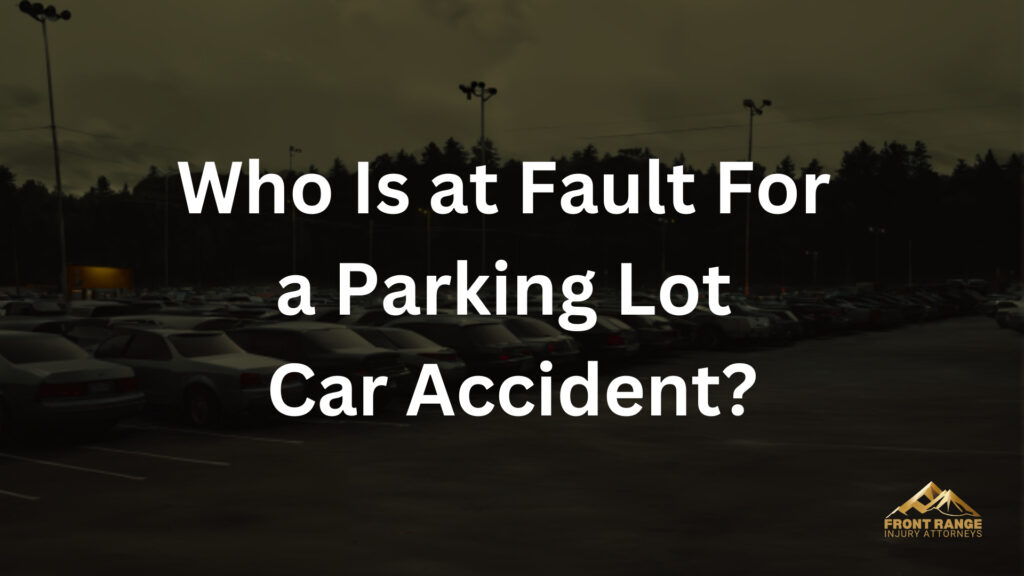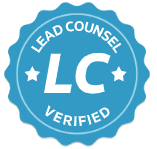Parking lots frequently serve as the stage for car mishaps in Colorado. The intricate layout of parking lots, faded markings, and inattentive drivers can all contribute to detrimental collisions. If you’ve recently found yourself entangled in a parking lot collision, you may have a claim for financial recompense from one or more responsible parties. Let’s delve into who could be held accountable for your accident.
If you sustained injuries in a parking lot collision in Colorado, contact Front Range Injury Attorneys today to schedule your free consultation. Our experienced legal team are knowledgeable and zealous advocates for our clients and their cases. We treat our clients as people, not case files. Learn more about how we can help you pursue compensation for your injuries and damages. Contact our Denver law firm to learn more.

Determining Fault in Parking Lot Accidents
- The Role of Traffic Rules: In a parking lot, as in any other traffic scenario, adhering to established rules is crucial. Failure to yield, running stop signs, or speeding can all contribute to accidents.
- Witness Statements: Eyewitness accounts often play a vital role in establishing fault. Their perspectives can provide valuable insights into the sequence of events leading up to the accident.
- Security Camera Footage: Many parking lots are equipped with surveillance cameras. This footage can serve as invaluable evidence, offering an objective account of what transpired.
- Vehicle Damage Assessment: Examining the damage to the involved vehicles can provide further clues regarding the sequence of events and the point of impact.
Assigning Blame in a Parking Lot Accident in Colorado
In a personal injury claim, the defendant is the individual or entity accused of causing the victim’s injuries. Following any type of car accident, it falls upon the victim to pinpoint the defendant and initiate a claim with their insurance provider. A parking lot collision case might involve one or multiple defendants. Our experienced accident attorneys will investigate your claim to determine the appropriate parties to pursue for compensation for injuries and damages.
The Driver’s Responsibility
Speeding, distracted driving, and reckless behavior can all lead to preventable parking lot accidents. If a driver, due to negligence or carelessness, collides with a pedestrian or another vehicle in a parking lot, they may be held liable for the resulting damages.
Property Owners’ Accountability
If the incident transpires on private property, the entity or individual who owns the parking lot could bear liability. This would be the case if a flaw such as a pothole or an unsafe parking lot layout contributed to the collision.
Municipal Responsibility
The governing city with authority over a public parking lot may be held responsible for damages if it could reasonably have taken additional measures to enhance safety. If proper upkeep or repairs could have averted the crash, the city may be deemed liable.
Parking lot accident cases can be intricate, particularly when neither driver is willing to admit fault. In most scenarios, the driver who lacked the right-of-way is deemed at fault, unless the other driver was behaving recklessly at the time of the collision. For example, the driver progressing down the lane would typically have the right-of-way and would not be held responsible for a collision involving a vehicle backing out of a parking spot.
Shared Responsibility
If two vehicles are both in the process of reversing, both drivers may share the blame for the accident. In a rear-end collision, the driver in the rear is typically considered at fault. If a driver cuts off an oncoming car to secure a parking spot, they will be held responsible. In a Denver pedestrian accident scenario, fault would be assigned to the party that failed to yield the right-of-way. Understanding the right-of-way specifics in your particular case may be pivotal in obtaining rightful compensation.
Steps to Take After a Parking Lot Accident
- Contacting Authorities: Notifying the police or relevant authorities is a crucial first step in the aftermath of an accident.
- Gathering Evidence: Collecting evidence, including photographs, witness statements, and any available camera footage, can be pivotal.
- Exchanging Information: Sharing contact and insurance information with the other party is a necessary procedural step.
- Seeking Medical Attention: Even seemingly minor accidents can lead to hidden injuries. Seeking medical attention promptly is advised.
- Notifying Insurance Companies: Informing your insurance company promptly is essential to initiate the claims process.
Colorado’s Fault Regulations
Colorado’s car insurance laws hold the at-fault party financially liable for all damages incurred. From the perspective of an insurance company, the at-fault party is the individual or entity primarily responsible for the car accident. Establishing fault in a parking lot car accident may necessitate a thorough investigation of events. An investigator will interview witnesses, scrutinize parking lot surveillance footage, and reconstruct the accident to discern its origins. Once the defendant is identified, victims can move forward with their claims.
Proving someone else’s liability for a car accident hinges on establishing four primary elements: duty of care, breach of duty, damages, and causation. You or your legal representative will need to demonstrate that the at-fault party had a duty to exercise reasonable care, failed in fulfilling this duty, and in doing so, caused the collision. Additionally, you must have sustained quantifiable damages, such as vehicle damage or personal injuries.
Comparative negligence in a parking collision
Colorado’s fault laws stipulate that an accident victim may recover financial compensation proportionate to their degree of negligence. The comparative negligence law allows victims to seek compensation as long as they are less than 50% at fault. In simpler terms, the courts will reduce your compensation award by your percentage of fault. Maximizing your compensation following a parking lot collision in Colorado may necessitate the assistance of a seasoned Denver car collision attorney.
Contact Front Range Injury Attorneys
Parking lot accidents may seem straightforward, but they can give rise to complex issues of liability. Understanding the nuances involved in determining fault is essential in ensuring a fair and just resolution. If you were injured in a parking lot accident, contact Front Range Injury Attorneys for a free case review. We can help you understand your legal rights and determine if we are the best law firm to help you pursue compensation.
FAQs
1. Can a parking lot accident be considered a hit and run?
A hit and run typically involves one party leaving the scene without providing necessary information. In a parking lot, both parties are usually present. If the negligent driver hit your car and fled or failed to leave their information, then it may be considered a hit and run accident.
2. What if I was partially at fault for the accident?
In cases of contributory negligence, both parties may share responsibility. Your insurance company will assess the degree of fault.
3. Are parking lot accidents considered minor incidents?
While they may not involve high speeds, parking lot accidents can still result in significant damage or injuries, so they should be taken seriously.
4. How can I prove the other party was reckless in a parking lot accident?
Evidence such as witness statements, camera footage, and damage assessment can help establish recklessness.
5. Should I hire a lawyer for a parking lot accident case?
For complex cases or disputes with insurance companies, seeking legal advice is advisable to ensure your rights are protected.
Colorado Car Accident Lawyers
If you suffered injuries in an auto accident caused by someone else’s negligence, you may be entitled to compensation for your injuries, medical bills, lost wages and other damages. Our experienced Colorado car accident lawyers help clients across the state pursue full and fair compensation for their accident-related injuries and financial losses. We help clients in Colorado with a wide range of motor vehicle collisions involving different types of vehicles, crashes and severity of impacts. Contact our law firm to discuss:
- Car accidents
- Distracted driver accidents
- Drunk driver collisions
- Head-on collisions
- Hit and run accidents
- Light rail crashes
- Autonomous vehicle collisions
- Limo accidents
- Rear-end accidents
- Rideshare collisions
- Road construction accidents
- RTD bus crashes
- School bus accidents
- Scooter accidents
- Taxi crashes
Although most of our motor vehicle collision clients hail from Denver, we also help clients in other parts of Colorado, including:
- Arvada car accidents
- Aurora car accidents
- Boulder car accidents
- Centennial auto crashes
- Colorado Springs auto accidents
- Colorado Springs drunk driving crashes
- Colorado Springs head-on collisions
- Colorado Springs military vehicle accidents
- Colorado Springs rear-end collisions
- Colorado Springs rideshare accidents
- Colorado Springs school bus accidents
- Fort Collins car accidents
- Greeley car accidents
- Highlands Ranch auto crashes
- Lakewood bus accidents
- Lakewood car accidents
- Lakewood distracted driver collisions
- Lakewood drunk driving accidents
- Lakewood hit and run crashes
- Lakewood rideshare collisions
- Littleton motor vehicle collisions
- Longmont car accidents
- Parker car accidents
- Pueblo car accidents
- Thornton car accidents
- Westminster auto collisions
No matter the type of auto accident or location in Colorado, our law firm is ready to talk to you about your case. Front Range Injury Attorneys offers free consultations for car crash cases so you can speak with our experienced personal injury lawyers at no cost and no obligation.









